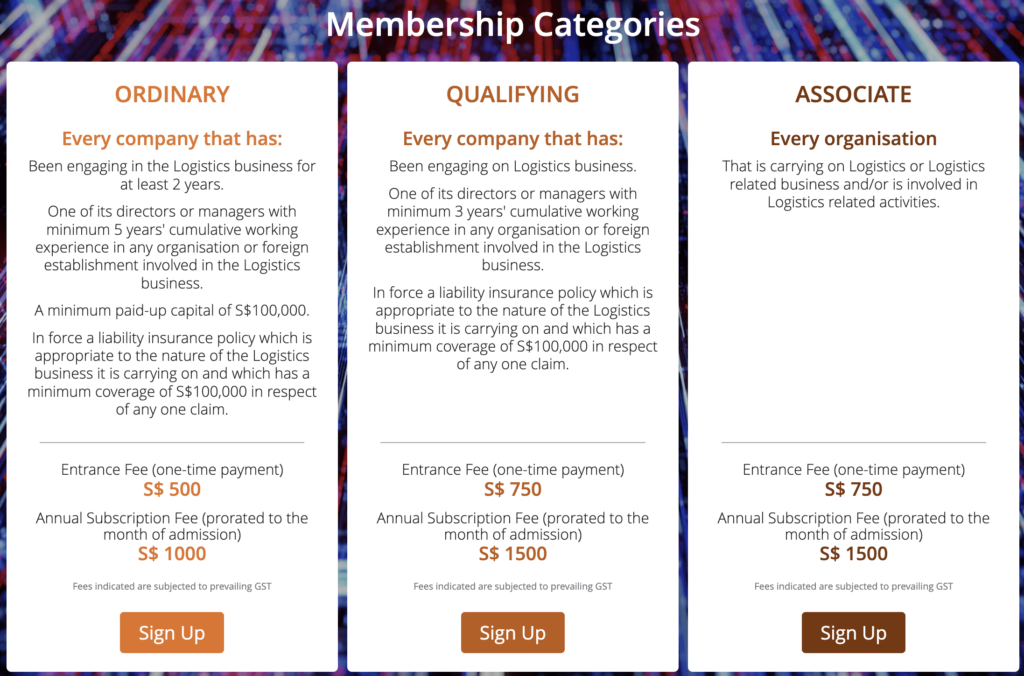Are you looking to join the Logistics Association Singapore (LAS) and want to learn more about what it entails? Have you been a member of LAS for some time now, but are curious about the various services and resources available?
No matter what your experience is with LAS, this blog post is for you. Here, we’ll provide an overview of everything you need to know about this organization and how it can benefit your business.
What does Singapore logistics Association do?
The Singapore Logistics Association (SLA) is a not-for-profit organization that is dedicated to promoting professionalism and excellence in the logistics industry. It is responsible for representing the interests of the industry in Singapore and works closely with the government and other stakeholders to ensure that the sector remains competitive and sustainable.
SLA offers a wide range of targeted programs and initiatives to help enterprises be future-ready, including offering GRT internships, organising conferences, providing training in IMDG Code, and offering practical advice on shipping batteries.
SLA also works with other associations such as Singapore Business Federation, IMDA and A*STAR to enhance the visibility of the industry and promote corporate income tax returns and IRAS requirements.
How to join Singapore logistics Association?

If you are interested in joining Singapore Logistics Association, there are some requirements that must be met.
Every company must have been engaging in the Logistics business for at least two years and must have one of its directors or managers with minimum five years’ cumulative experience.
In addition, applicants must have completed the SLA LEAD 2 Programme. Furthermore, each application must be endorsed by two existing SLA Members, with one of them being an Ordinary Member.
If you meet all these requirements and wish to join, you can submit your application through the SLA website.
1. What is the Singapore Logistics Association?
The Singapore Logistics Association (SLA) is the national body that represents the logistics industry in Singapore.
Established in 1973 as the Singapore Freight Forwarders Association, SLA was rebranded to better reflect its mission to promote professionalism and excellence in the logistics industry.
In its role as the national body, SLA organizes numerous capabilities building programmes, 1-to-1 business advisory and participates in workforce studies that benefit more than 212 companies. It also provides members with a platform to enhance their visibility by announcing admissions to their membership.
In addition, SLA works in partnership with the Singapore Standards Council and Enterprise Singapore to provide practitioners with a definitive guide for airfreight forwarding and helps organize The Logistics and Transportation Conference 2022.
They also offer courses such as the Certificate in Applying IMDG Code and provide guides on shipping batteries and corporate income tax returns.
2. The Practitioner’s Definitive Guide: Airfreight Forwarding
The Singapore Logistics Association also provides members with access to resources like The Practitioner’s Definitive Guide: Airfreight Forwarding, which is a comprehensive guide written by Ho Chee Mun that explains the concepts and applications in airfreight. Not only does it provide up-to-date information on current practices, but the book also features real-life case studies to illustrate actual field applications.
This book is an invaluable resource for those looking to get into the field of airfreight forwarding.
3. The Singapore Standards Council and Enterprise Singapore
The Singapore Standards Council and Enterprise Singapore have been developing and reviewing standards for the logistics sector, so companies need to think about how they can meet these standards for service quality.
Singapore Logistics Association (SLA) works closely with the Singapore Standards Council and Enterprise Singapore to ensure that the standards are up to date and relevant to the industry.
The SLA also provides guidance on the implementation of these standards, helping companies to comply with the applicable regulations.
In addition, the SLA organizes various events such as workshops and seminars to educate stakeholders on the importance of meeting these standards.
4. The Logistics and Transportation Conference 2022
The Logistics and Transportation Conference 2022 provides an opportunity to join other industry professionals, network, and exchange ideas. It is a great platform to learn more about the upcoming trends in the industry and how to further enhance the Singapore logistics sector.
The conference will be held on 7th April 2022 at the Suntec Singapore International Convention & Exhibition Centre. It is organized by the Singapore Logistics Association, the representative body of Singapore logistics, with a mission to promote professionalism and excellence in the logistics industry.
5. Certificate in Applying IMDG Code
If you’re looking to make a name for yourself in the world of logistics, consider getting certified in applying IMDG Code. The Singapore Logistics Association has partnered with recognised training service providers to offer this certificate.
It covers the regulations surrounding the safe transportation, storage and packaging of dangerous goods, such as those outlined in the International Maritime Dangerous Goods (IMDG) Code. Whether you need to be familiar with flexitanks or the amendments of the IMDG code, this certification will equip you with all the necessary knowledge.
6. DHL Express: Your Time Definite International Shipping Expert
For those looking for a reliable and experienced international shipping expert, DHL Express is a great choice. With over 50 years of experience in the global logistics industry, DHL Express offers fast, reliable and cost-effective international shipping services.
From airfreight forwarding and customs clearances to ocean freight forwarding and supply chain management, DHL Express has the expertise and resources to handle all your international shipping needs.
As one of the largest providers of third-party logistics services in the world, DHL Express is well-equipped to provide customers with a time-definite international shipping experience.
7. Shipping Batteries – What You Need to Know
When it comes to shipping batteries, there are a few requirements that you need to take into consideration. The Singapore Logistics Association provides guidance material on how to safely ship lithium-ion and other batteries internationally, including understanding restrictions, prohibitions and suitable packaging.
To help shippers understand the necessary regulations related to the transport of lithium batteries, they offer packing instructions and certificates such as the Certificate in Applying IMDG Code.
You should also be aware of the restrictions and prohibitions in place for air transport, and if you’re unsure of the applicable codes, FedEx’s Guide to Packing and Shipping Electronics is a great resource.
8. Corporate Income Tax Returns and IRAS Requirements
If you are running a business in Singapore, it is important to comply with the relevant regulations and filing requirements of the Inland Revenue Authority of Singapore (IRAS).
All companies are required to file two Corporate Income Tax Returns to IRAS every year: Estimated Chargeable Income (ECI) and Form C-S/ Form C-S (Lite)/ Form C.
The deadline for filing your Corporate Income Tax Return (Form C-S/ Form C-S (Lite)/ Form C) for the Year of Assessment (YA) 2022 is 30 Nov 2022, and companies must file their outstanding Corporate Income Tax Returns within 21 days from the date of application.
Additionally, your company is required to prepare its financial statements, tax computation and other supporting documents before completing Form C-S/ Form C-S (Lite)/ Form C.
It should also be noted that not all income is taxable in Singapore, so it is important to understand what taxable income is and how corporate income tax is assessed in Singapore.
9. How Corporate Income Tax is Assessed in Singapore
When it comes to corporate income tax in Singapore, there are some general rules that you should be aware of.
Corporate Income Tax is assessed on a preceding-year basis and the rate is 17%. Companies are required to file their Corporate Income Tax return within three months of the end of the financial year unless they qualify for a partial tax exemption or a three-year start-up tax exemption.
It is important to understand the rules and regulations related to corporate income tax in order to ensure compliance with all legal requirements.



